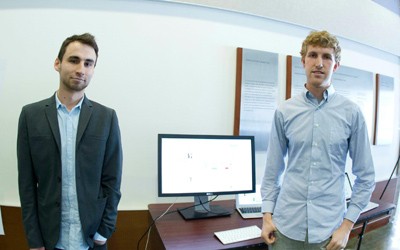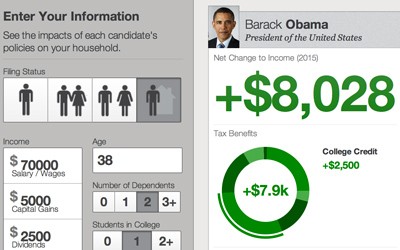Decisions, decisions

Former UC Berkeley student Nikita Bier (left) and and current EECS student Jeremy Blalock founded Politify in the fall of 2011. (Photo by POLITIFY.)
It has been a busy year for the developers of the new web app, Politify. It was only October of 2011 when Nikita Bier, then a political economy and business major, approached Jeremy Blalock, a second-year EECS student, to collaborate on an easy-to-use app to analyze public policy. They developed a non-partisan tool that enables voters to evaluate the costs and benefits of each presidential candidate’s promised policies.
“I joined this project because a lot of the news media just deals with the points that they can cover best, which are the soft points,” says Blalock. “Politify really presents the flip side of the scale, the economic side of politics. When I listen to NPR I hear a lot of interesting information, but I don’t actually hear how it will affect me, which is a very relevant thing to consider when voting.”
If the idea of running a political web app covered in the national media during a close and contentious presidential election while keeping up with regular coursework is daunting, Blalock doesn’t show it. The Monterey, California native says he’s been interested in web development since he was 14 and has worked on several other web-based projects over the years, most recently a daily deals site. But, so far, Politify is Blalock’s most ambitious project.
The first step in the Politify process is curating and parsing open data from the Internal Revenue Service and the Census Bureau, then overlaying economic models from the nonpartisan Tax Policy Center. “You can do some amazing things with free data,” Blalock says. “If you want to pay, you can do even more amazing things, but you can figure out crazy amounts of information just with what’s openly available.”

For the 2012 presidential election, Politify provides users with individual, local and national break-downs. Pictured here is an example of a local interface. (Photo by POLITIFY.)
The result is an economic forecast that shows the candidates side-by-side. The analysis is broken down to the individual level, the local level and national level. The cost and benefits of the candidate’s position change based on user user-inputted income, tax filing status and zip code.
Politify takes strides to maintain objectivity. Blalock insists they are in the business of transparent information, not political advocacy. “Our overarching goal is to make a more informed voting public. I think if we can make people more informed then they will be more engaged,” he says.
In the run-up to the election, Politify had received over a million views. Post-election, they plan on continuing the project. “We want this to be applied to other things down the road, and we think this can be used for other policies,” says Blalock.